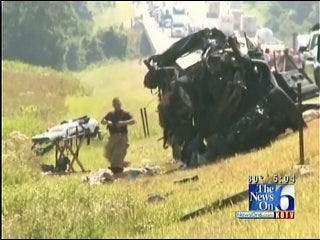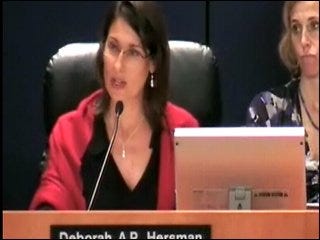NTSB Cites Fatigue In 2009 I-44 Crash That Killed 10 Motorists
Federal safety investigators say a tractor-trailer truck driver who slammed his rig into a line of cars stopped on a stretch of Oklahoma highway last year, killing 10 people, was likely suffering from fatigue.<br /><br /><a href="http://www.ntsb.gov/" target="_blank">National Transportation Safety Board</a>Tuesday, September 28th 2010, 8:04 am
By Dan Bewley, The News On 6
WASHINGTON, D.C. -- The driver of a tractor trailer that slammed into a row of cars on the Will Rogers Turnpike last summer was most likely suffering from driver fatigue. The National Transportation Safety Board released its report Tuesday at a hearing in Washington, DC.
Donald Creed, 77, pleaded guilty to causing the crash that killed 10 people on June 26, 2009. Creed was sentenced to 30 days in jail and placed on probation for ten years.
8/2/2010 Related story: Truck Driver Pleads Guilty To Negligent Homicide In Will Rogers Turnpike Crash
The National Transportation Safety Board says Creed began driving at 3 a.m. on June 26 and had less than five hours sleep. The crash happened at 1:19 p.m. Investigators say Creed had taken several vacation and sick days the month before the accident. They say he had reported excessive daytime sleepiness and loud snoring earlier that month and had mild sleep apnea.
"Fatigue can be created by multiple factors and in this accident too little sleep, the drivers shift work schedule, and mild sleep apnea all played a part," said Deborah Hersman, NTSB Board Chairman.
The NTSB also criticized Associated Wholesale Grovers, the company for which Creed was driving. Investigators pointed out that AWG did not have a formal policy dealing with driver fatigue and that its only training video on the subject was fourteen years old and had not been updated.
One board member also pointed out that Creed showed he was not a responsible driver by not wearing his seatbelt.
"The fact that this driver didn't even use the most basic safety measure, I believe that speaks to his lack of regard to his own personal safety but also his lack of compliance and respect for the laws and the regulations," Robert Sumwalt, NTSB Board Member, said.
Read the Oklahoma Highway Patrol report.
The board recommended companies take driver fatigue seriously and that collision avoidance technology and video recorders become standard issue on all tractor trailers.
"We've learned from investigating this accident that the approach needs to be multi-pronged, that we need to address the human, the machine, and the environment," Hersman said.
More Like This
September 28th, 2010
September 29th, 2024
September 17th, 2024
Top Headlines
December 11th, 2024
December 10th, 2024
December 10th, 2024
December 10th, 2024












